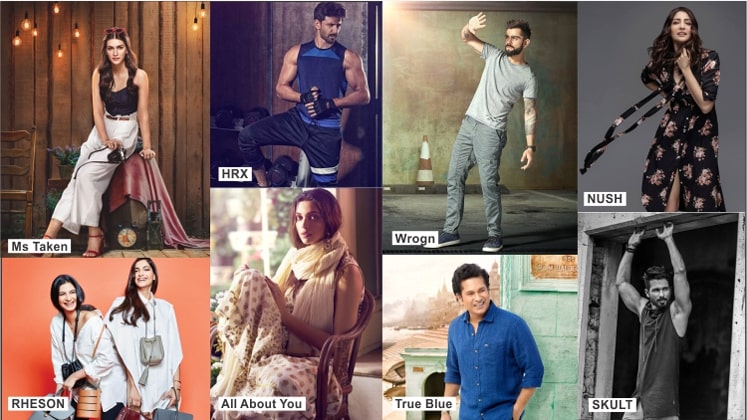
Celebrities and fashion are quite inseparable and it’s about time that the market realises the potential of this combination, thereby presenting us with ‘celebrity-led brands’. Celebrities have the power to influence with their following and reach to almost the entire country, and in some cases, outside the country as well. The trend started in the West and Hollywood when legendary actress Gloria Swanson started her own clothing line in 1950s. However, it was 2000 onwards that the trend started gaining serious momentum and celebrities started launching their brands for clothes, footwear and even accessories. Even as it all started from the West, India is not far behind, and of late, A-listers in the country are turning into fashion brand owners and entrepreneurs – some with their own fashion brands, while others in collaboration with established fashion companies.
India has the biggest following of Bollywood stars and cricketers, and it’s not surprising that nearly all celebrity brands so far have come from these celebrities. John Abraham started this in India with his clothing line in 2006 and later Salman Khan launched his brand Being Human in 2012, followed by Hrithik Roshan’s HRX in 2013 and then came a series of loved and popular celebrity brands including All About You by Deepika Padukone, Rheson by Sonam K Ahuja and Rhea Kapoor, NUSH by Anushka Sharma, Wrogn and One8 by Virat Kohli, Seven by MS Dhoni, True Blue by Sachin Tendulkar, among many others.
Why celebrity-led brands?
Celebrity endorsements and advertisements have always been there to connect with the consumers and to enhance the marketing strategies. In fact, according to a study by Duff and Phelps, celebrity endorsements have been a key aspect of Indian marketing which is evident from the fact that close to 50 per cent of endorsements in India feature celebrities as compared to around 20 per cent in the US. Film stars currently dominate the endorsement industry with 76 per cent share of the market, followed by sportspersons with 12 per cent. As per its 2018 Celebrity Evaluation Report, the brand value of top 15 celebrity endorsers in India has grown by about 13 per cent from US $ 691 million in 2017 to US $ 782.2 million in 2018; in that, cricketer Virat Kohli has retained the top position of being the most valuable celebrity brand and it has gone up to US $ 237.5 million in 2019.
With such increased confidence of retail brands in celebrity endorsers, it was only logical for these celebrities to cash in on their growing popularity and influence and give the consumers an idea or a concept or the relatability factor in the fashion merchandise they purchase. Also, the world is slowly moving beyond the age of endorsements to the era of advocacy and celebrity brands offer the celeb’s persona and charisma as its USP which helps the consumer connect with the brand all the more. “Brands across the globe have experienced the power of celebrity fashion brands, their influence and their reach. Creating meaningful engagements for brands with their consumers has become the need of the hour. Customer expectations are pushed to new heights which are easier to fulfil with the engagement of a celebrity. With celebrity-led brands, we have more than just the face endorsing the brand. The celebrity’s persona, values… all becomes a part of the brand. The celebrity himself/herself is at the heart of any good celebrity-led brand,” asserts Kunal Mehta, Chief Operating Officer, Being Human Clothing.

Besides, fashion e-commerce major Myntra too is going big on celebrity-led brands by associating with celebrities for launching their brands while also offering its platform for growing celebrities’ brands. The celebrity-backed private labels and other related associations help Myntra differentiate itself from the rest and as a premium brand. Myntra offers South-Indian film actor Mahesh Babu’s menswear brand, The Humble Co; Vijay Deverakonda’s Rowdy wear; HRX by Hrithik Roshan, House of Pataudi by actor Saif Ali Khan and has recently acquired full stake in Deepika Padukone’s All About You. Talking on the celebrity-led brands, Amar Nagaram, CEO, Myntra, has told Economic Times, “Fashion, in India, is heavily influenced by films and superstars who command a massive fan-following. Celebrity-led brands have been extremely successful on Myntra, especially in Tier-2 and Tier-3 cities and towns that are emerging as important markets for domestic and international fashion brands.”
Also Read: Riding the cold wave: Outerwear industry’s day in the sun
Do the brands speak the celebrity language?
With the emergence of social media and the world living most of their lives on these platforms, celebrities have found a direct connect with their fans and this further pushes them to launch a brand for these fan base rather than merely endorsing one. However, the job’s not done at just launching the brand with a celebrity name; the celebrity needs to get involved and make the brand communicate with its target consumer, convey what the celebrity stands for, give it an authentic voice. The celebrities need to be involved in every aspect of the creative, the product, the marketing, the distribution of the brand.

Arun Pandey, Chairman & MD, Rhiti Group (which owns Seven by MS Dhoni), avers, “Celebrity-led brands help in breaking the clutter and enhancing credibility, so definitely a brand by a star gets the first mover advantage with the consumers. However, these brands ought to have a brand concept. Seven by MS Dhoni is a call for change, it’s an appeal to the modern youth, #changemakers. Seven encapsulates the philosophy of an active lifestyle for the young. It aims to provide accessible fitness not just to sportspeople, but anybody who wants to have an active and health-conscious lifestyle. MSD is highly involved with the Seven brand – from the concept and design to the end product. His insights as an athlete immensely help the team in conceptualising and creating new products. We send all our design samples to MSD for his opinion and advice. And honestly speaking, he guides the team to bring the best out of them. That being said, I think in order to make a celebrity-led brand successful, the celebrity should ideally be using the product to make the customer believe in the brand.”
Like Seven, One8 by PUMA and Being Human agree to the relevance of the brand concept. While Being Human has the unique USP of ‘celebrity, charity and fashion’ and part of its sale proceeds to The Salman Khan Being Human Foundation which works towards changing lives through healthcare and education initiatives, One8, derived from Virat Kohli’s jersey number 18, is reflective of his persona and the collection demonstrates his bold and dynamic personality while staying true to his passion of pursuing an active lifestyle.

Talking about the design aesthetic of One8, Abhishek Ganguly, General Manager – Southeast Asia & India, Puma, says, “By incorporating subtle branding, look and feel, PUMA has emphasised the simplicity of Virat’s personal style, while bold graphics are infused to connect with Virat’s on-field identity. Across the collection, PUMA uses premium fabrics crafted with a contemporary style. Also, the colour choices are clearly out-and-out Virat. You will always see whites, blacks and olives in the collection because these are his favourite colours. For this collaboration, PUMA enables everything from design, product development, manufacturing to the entire distribution network and marketing. Virat brings to the table his inputs on design. Even today as the range becomes broader, he actually checks every design element and gives inputs. It could be a tedious process, but he’s extremely invested in this collection. The fact that he’s is wearing PUMA One8 all the time really works for us as a brand.”

Furthermore, celebrity-led brands are not just served with success basis the popular name attached to it. They need to compete with other celebrity-led brands and also with already established fashion labels. Also, consumers today are vigilant and even as these brands get a leg-up in the initial days, in the long run, nothing substitutes quality products. Besides, public activities of the celebrity associated with the brand also affect the success of these brands. “Celebrities are public icons and are followed by masses. Their activities have a huge bearing on their brand image. Consistency in performance of a celebrity drives its brand value. Maintenance of the status quo results in maintaining popularity and fan following and ultimately in sustained brand value,” explains Kunal Mehta.
Also Read: Is India’s untapped online luxury market a success in the waiting?
Extent of the glamour quotient
The celebrity-led brands are not only retailing through offline and online channels in India, a few of them have also expanded into the international markets. Building on the existing brand is what the game is all about and the phenomenon is here to stay, as a number of celebs continue to launch themselves into the fashion business. While there are a few challenges around maintaining the brand’s values in line with the celebrity associated and creating all the marketing strategies around the same lines, etc., Arun Pandey maintains, “One needs to focus and strike a balance between the brand and celebrity. Marketers cannot be too reliant on celebrities. Celebrities, who are associated with multiple brands, may also lose their impact and credibility with customers. Celebrity endorsement is also about the reflection of the values from the celebrity to the product he/she endorses, and hence, the personal integrity of the celebrity becomes very important to create brand impact and recall. Any negative publicity or personal scandal involving the celebrity can affect the brand imagery also.”
Like all segments in the fashion industry, this too has its fair share of advantages as well as disadvantages, but it all fares well for the brand and the celebrity who knows how to leverage the glamour quotient and in what quantity. It was a well-devised strategy for One8 as Abhishek Ganguly prides, “In India, the acceptance of Virat Kohli is massive. We have not done such a collaboration in India before and we did it because we believed in it. We knew Virat would be that brand that people would connect with and would love to wear themselves. As a result, the collaboration with Virat Kohli has been one of the most successful for us globally. In the first year of its launch, PUMA One8 clocked the revenue of Rs. 100 crore and currently accounts for almost 10 per cent of our overall sales.” Similarly, even during the ongoing crisis, Rhiti Group is targeting a turnover of Rs. 50 crore this financial year.
Also Read: Yogawear segment gets its own ‘movement space’ during stay-at-home days







